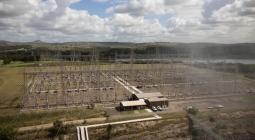Tuesday was world’s hottest day on record – breaking Monday’s record

World temperature records have been broken for a second day in a row, data suggests, as experts issued a warning that this year’s warmest days are still to come – and with them the warmest days ever recorded.
The average global air temperature was 17.18C (62.9F) on Tuesday, according to data collated by the US National Centers for Environmental Prediction (NCEP), surpassing the record 17.01C reached on Monday.
Until the start of this week, the hottest day on record was in 2016, during the last El Niño global weather event, when the global average temperature reached 16.92C.
On Tuesday, the World Meteorological Organization, the UN’s weather body, confirmed El Niño had returned. Experts predicted that, combined with the increased heat from anthropogenic global heating, it would lead to more record-breaking temperatures.
“El Niño hasn’t peaked yet and summer is still in full swing in the northern hemisphere, so it wouldn’t be surprising if the record were broken again in coming days or weeks,” said Dr Paulo Ceppi, a lecturer in climate science at the Grantham Institute, Imperial College London.
Dr Karsten Haustein, a research fellow in atmospheric radiation at Leipzig University, said: “The coming days will probably see a small downturn, but since the annual global temperature maximum is at the end of July, more days are likely to be warmer than yesterday (given that El Niño is now pretty much in full swing) …
“Chances are that the month of July will be the warmest ever, and with it the hottest month ever … ‘ever’ meaning since the Eemian, which is indeed some 120,000 years ago.”
The record-breaking mean temperature was reported by the Climate Reanalyzer service hosted by the University of Maine’s Climate Change Institute. It uses data from the NCEP’s climate forecast system to provide a time series of daily mean two-metre air temperature, based on readings from surface, air balloon and satellite observations. The Guardian contacted the Climate Change Institute for comment.
Various parts of the world have been experiencing heatwaves. The Met Office said on Monday that the UK had had its hottest ever June. The southern US has been sweltering under an intense heat dome in recent weeks, including on the national 4 July holiday on Tuesday. In parts of China, an enduring heatwave continued, with temperatures above 35C.
North Africa has experienced temperatures near 50C, and in the Middle East thousands have been enduring unusually scorching heat as they make the hajj religious pilgrimage in Saudi Arabia.
Even Antarctica, where it is currently winter, has registered anomalously high temperatures. Ukraine’s Vernadsky research base, in the vast frozen continent’s Argentine Islands, recently broke its July temperature record with a reading of 8.7C.
“The temperatures creating these record-breaking days match exactly expectations under human-caused climate change,” said Ilan Kelman, a professor of disasters and health at University College London’s Institute for Risk and Disaster Reduction.
“As the rising temperatures drive worsening heatwaves, including terrible humidity, we expect to see substantial increases in related deaths. Many people cannot afford indoor cooling and some people must be outside for work. Heat-humidity then becomes the silent killer, since we often do not realise how many people are in lethal difficulty, especially when it does not cool down at night.”
cover photo:A taxi driver tries to cool off in Tehran as temperatures in the Iranian capital exceed 35C. Photograph: Abedin Atehrkenareh/EPA





